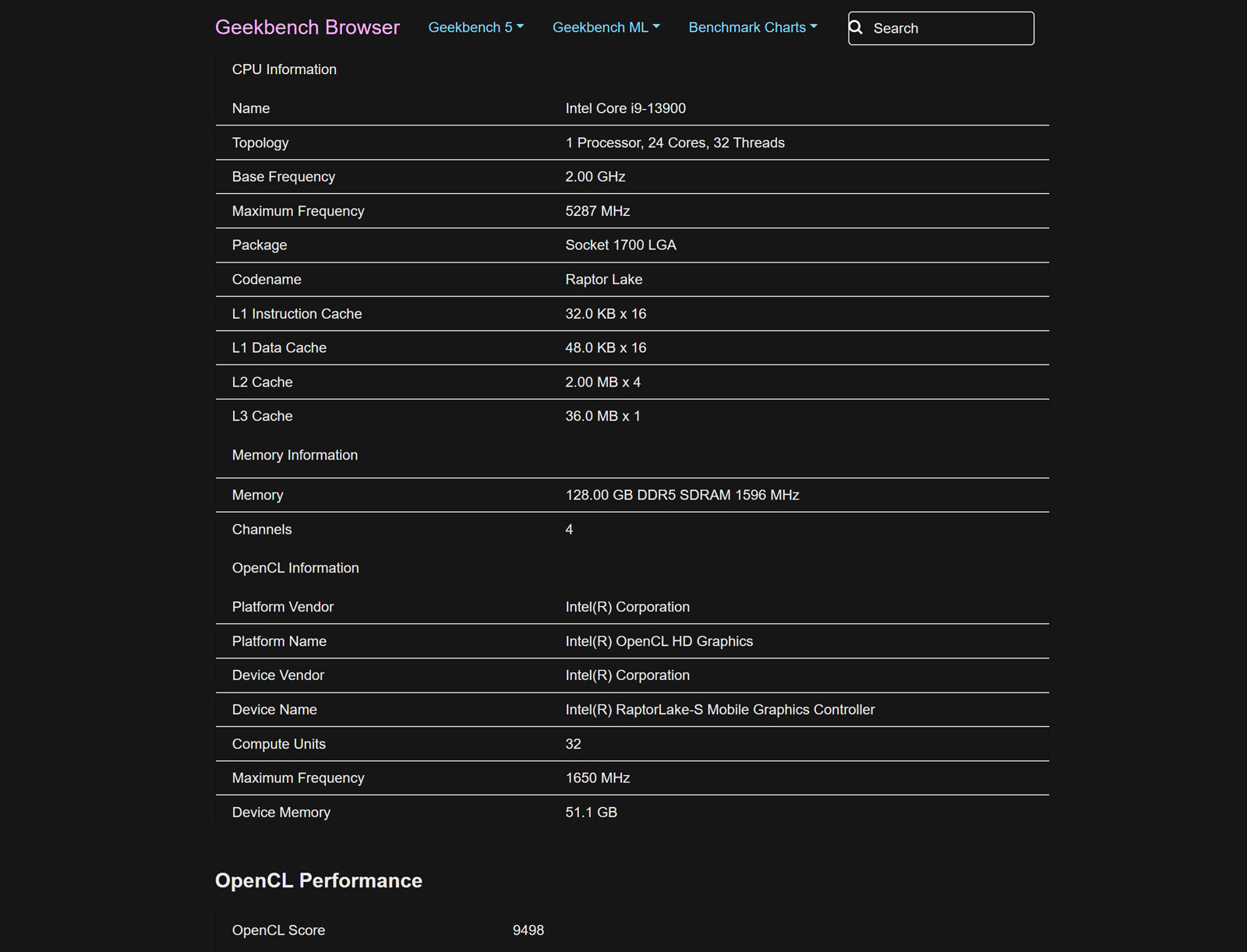Raptor Lake iGPU Catches Up To AMD Vega 10 In OpenGL Benchmark
Core i9-13900 iGPU goes for a spin in Geekbench's OpenCL test.
A benchmark result has surfaced, providing insight into the integrated graphics performance of Intel’s 13th Generation Raptor Lake processors. Twitter’s Benchleaks spotted a Geekbench OpenCL test result which appears to have been precipitated by a passing HP desktop PC packing an Intel Core i9-13900. The hardware sleuth compared the 9,498 score against an Nvidia GeForce RTX 3070, noting that it was about 93% slower in Geekbench’s range of OpenCL tests.
The online result browser provides an outline sketch of the HP system, primarily skewed towards the CPU portion of the processor. It suggests that the Core i9-13900 has 24C / 32T (as expected), a base clock of 2 GHz, and a max frequency of 5.3 GHz. Moreover, it reports the Raptor Lake chip has 36MB of L3 cache.
Moving along to the GPU specs revealed by Geekbench, there are very few, but the integrated graphics chip is said to feature 32 EUs and run at a maximum frequency of 1.65 GHz. In contrast, the Core i9-12900 uses Intel UHD Graphics 770. In that case, we note the number of EUs remains unchanged but the maximum frequency has improved by 100 MHz for Raptor Lake. Thus the iGPU in the Raptor Lake chip is clocked up to 6.5% faster than the Alder Lake chip.
With the 6.5% max GPU clock, one would expect better from the Raptor Lake iGPU. Its 2.6% improvement doesn’t quite align with its potential on paper. However, for an office productivity machine (this is an HP pre-built, remember), it will likely be adequate and isn’t a slouch compared to AMD Vega 10 or Nvidia MX350.
Of course, it pales in comparison with the likes of the GeForce RTX 3070. Furthermore, if you want some closer discrete desktop GPU references, we could say it is slightly overshadowed by oldies like the GeForce GTX 750 or Radeon RX 540 in Geekbench OpenCL. Lastly, you must add a pinch of salt to pre-launch benchmarks undertaken by unknown parties.
|
Raptor Lake |
Alder Lake UHD 770 | AMD Radeon Vega 10 |
GeForce MX 350 |
GeForce RTX 3070 | |
|---|---|---|---|---|---|
|
OpenCL score |
9,498 |
9,253 |
9,635 |
13,546 |
135,064 |
Intel Raptor Lake CPUs should debut in the coming weeks, probably before October is over. Please check our all-we-know article regularly to keep up to date with everything we learn about Intel’s 13th Gen Core processors and 700-Series chipset motherboards.
Get Tom's Hardware's best news and in-depth reviews, straight to your inbox.

Mark Tyson is a news editor at Tom's Hardware. He enjoys covering the full breadth of PC tech; from business and semiconductor design to products approaching the edge of reason.
-
dwd999 Not really interesting at all. Let's see a real comparison between the igpu's of the 13900K and Ryzen 9 7950X. That would at least be relevant when both are available.Reply -
jeremyj_83 Reply
The iGPU for the 7950X isn't anything big. It is only for basic desktop functionality.dwd999 said:Not really interesting at all. Let's see a real comparison between the igpu's of the 13900K and Ryzen 9 7950X. That would at least be relevant when both are available. -
dwd999 Reply
So is the igpu in the 13900 laptop tested and so is the AMD Vega 10 laptop chip tested. My point is that what people are really interested in is the performance of the new desktop chips.jeremyj_83 said:The iGPU for the 7950X isn't anything big. It is only for basic desktop functionality. -
gamr Reply
but its from rdna2. should be better then intels iris/uhd stuff.jeremyj_83 said:The iGPU for the 7950X isn't anything big. It is only for basic desktop functionality. -
watzupken I don't think this is a fair comparison. Vega 10 is quite old since newer APUs from AMD all features Vega 8 as the fastest solution. Age aside, the main reason why the 32CU Intel graphics can catch up is likely attributed to the use for DDR5 memory, while the Vega 10 is limited to something like DDR4 2400 or 2666. GPUs being bandwidth hungry will certainly benefit from higher memory bandwidth. And we actually don't know what is the specs of memory used between the 2 test results.Reply -
escksu Nay, its still a distance away from MX350.Reply
I am not concerned with desktop CPUs but if laptop CPUs could have iGPU thats similar to MX350 in performance, it will be great. Imagine we have a laptop that could do some light gaming (MX150 10W variant could run WOT at 720p low settings). If this iGPU could allow WOT 1080p low settings, it will be great improvement. -
jeremyj_83 Reply
Just because it is RDNA2 doesn't mean it is going to have enough GPU cores to keep up. From what I have heard this is going to have like 2 CU's, which is less than you see on things like the Athlon 3000G.gamr said:but its from rdna2. should be better then intels iris/uhd stuff. -
jeremyj_83 Reply
I believe that the 13900 is going to have more than the 7950X's 2 CU. The 12900k has 32 EU's for example and we can easily assume the same will be true for the 13900.dwd999 said:So is the igpu in the 13900 laptop tested and so is the AMD Vega 10 laptop chip tested. My point is that what people are really interested in is the performance of the new desktop chips.
